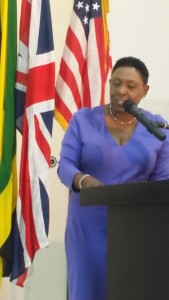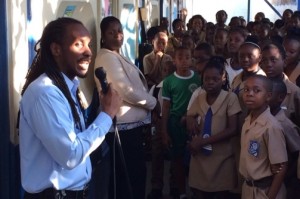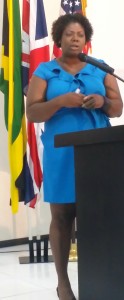
Should Masculinity in Jamaica Be Redefined?
April 5th, 2016
“Masculinity needs to be redefined.”
So says Anika Gray. Anika Gray is an attorney-at-law. She is also a Chevening Scholar, who pursued her Masters in Public Policy at the Blavatnik School of Government, University of Oxford. Her focus is on Human Rights, Health and Infrastructure Policy. But today, at the launch of a U.S. and UK Government-funded project, she was talking about Domestic, Sexual and Gender-based Violence in Jamaica.

Minister of Gender Affairs Olivia Grange says the issue of gender-based violence is “intransigent and complex,” but that we must “be our brother and sister’s keeper.”
The Domestic, Sexual and Gender-Based Violence Project represents a very welcome collaboration between the two governments, who are funding the resumption of a training program for police and front-line workers that took place from 2000 – 2004. The Jamaica Constabulary Force and the non-governmental organization Woman Inc will implement the program. The trainees will be sensitized to their crucial role as peace-keepers and peace advocates, protectors of victims of rape, sexual harassment and domestic violence. They must understand that it is their responsibility to respond in a timely and sensitive way to such incidents. Trainees will also gain an understanding of the Domestic Violence Act and other laws under which they have responsibilities to the public. In other words, the police need to take domestic, sexual and gender-based violence seriously.
Ms. Gray comes from “deep rural Jamaica” – Geddes Town in St. Mary, to be precise. Her memories of growing up were of a routine – going to church, going to school. Then there were other regular occurrences: the sounds of anger and conflict at her neighbors’ house. Sounds of violence. The community, she said, accepted this as “man and woman story.” Domestic violence was considered the norm. She quoted one judge, who described the violence as normal, part of the “wear and tear” of being a couple.

Chevening Scholar and Member of Parliament Alando Terrelonge talking to students at Naggo Head Primary School in St. Catherine last year.
Another Chevening Scholar (he studied at the University of Warwick), Alando Terrelonge spoke of this sense of “normalcy.” Also an attorney-at-law by profession, Terrelonge was recently elected Member of Parliament for East Central St Catherine. The British High Commission is proud that he is the first Jamaican Chevening Scholar to reach elected office. Having worked with youth, Terrelonge is concerned that young children, in families where violence is literally taking place every day, quickly come to accept it as the norm. How can we rescue them from the cycle?
Ms. Gray reminded us that gender-based violence is not only a conflict between man and woman, with the male partner generally the perpetrator. It is a girl’s first experience of forced sex (and that is many girls’ first experience of sex, sadly); it is sexual harassment on the street and in the workplace; it is the “corrective rape” of LGBT women; it is violent attacks on gay men by other men, who feel threatened by them. It ruins many lives, irreparably.
The vast majority of these crimes are committed by men. This is simply a fact. However, as Nadeen Spence, who moderated today’s event pointed out, whenever gender-based violence is discussed there are very few men in the room. We were happy to see that there was a good gender balance in the audience at this event. This is actually quite unusual.
So, men must be brought into the conversation and must take a hard look at themselves. I often wonder whether these abusive “macho men,” who feel they must have a woman to control, are actually satisfied with their lives. Time to talk. Here’s one important point, though: as Ms. Spence observed at the end of the discussion, we need to have conversations, one on one or in small groups, with people outside the confines of hotels and seminar rooms. While discussions like these help to distill ideas and possible solutions in people’s minds, the important thing is to go out and act on them. Talk to people, help them to see themselves and their lives differently; guide them, perhaps, towards redefining their own relationships. Otherwise, we will not see change.
Baroness Verma, Parliamentary Under-Secretary of State at the Department for International Development (DIFID) in the UK, emphasized the importance of male involvement. She wants the program to “involve the voices of men and boys – as champions, as supporters.” This echoes the United Nations’ #He for She campaign, which emphasizes that gender equality is a human rights issue, and not only a women’s issue.
Indeed, as U.S. Ambassador Luis Moreno indicated, gender-based violence cannot be separated from the prevailing general violence in our society. Gender Affairs Minister Olivia Grange noted that“this is not the time to turn a blind eye” to the issue; and that close collaboration is needed, including with colleagues at the Ministry of National Security. The Bureau of Gender Affairs is drafting an Action Plan, which Minister Grange said would be submitted for Cabinet approval by the end of May.
How can Jamaican masculinity be redefined? I believe it takes all hands on deck. There is much work to do. Back in the day, we called it “solidarity.” It’s time to bring it back.
Tags: Alando Terrelonge, Anika Gray, Baroness Verma, British High Commission, Bureau of Gender Affairs, Chevening Scholar, Department for International Development, DIFID, Domestic Violence Act, gender equity, gender-based violence, He For She, human rights, Jamaica, Jamaica Constabulary Force, Luis Moreno, masculinity, Nadeen Spence, NGO, Olivia Babsy Grange, rape, sexual harassment, sexual violence, training, U.S. Embassy, United Nations, Woman Inc
The Gleaner reserves the right not to publish comments that may be deemed libelous, derogatory or indecent.
To respond to The Gleaner please use the feedback form.
5 Responses to “Should Masculinity in Jamaica Be Redefined?”
- We Are the Zoomers
- Living Online with Humans and Birds: NAOC 2020
- Human Trafficking and the Problem of Public Education
- Down Memory Lane
- Are We Ready to Recover from COVID-19?
- Road Safety Matters: Is Your Vehicle Safe?
- Sexual Harassment, Me Too, and the Minister’s Disturbing Giggle
- The Vulnerable Senior Citizens, Private Care Homes and COVID-19
- A Muddle Over Masks
- Here is Something Life-Saving You Can Do: Give Blood!





[…] of an earlier four-year program. I wrote about it in my Gleaner blog Social Impact, here: http://gleanerblogs.com/socialimpact/?p=3242 It’s good that the British High Commission and the U.S. Embassy are collaborating on this. I […]
This discussion is very vital and the colloberation and sensitization among the stake holders mentioned are much needed. However, let me add that this is a discussion which I believe must be taken into the schools at all levels. Bend the trees from they are young. Teach little boys how to deal with issues without resorting to violence and little girls how to value themselves and not become continued victims of violence (and vise versa).
I absolutely agree with you. One or two government officials (including the State Minister for Youth) have spoken of the need to have children sensitized at a much younger age, and the Child Development Agency has developed such a program. Of course it needs to go out into schools – but then, it is in the home that these things are happening. It is really difficult and needs to be attacked on all fronts! Thank you.
Another step being taken to introduce homosexuality, gay marriages and adoptions etc in Jamaica. US spends billions to spread sodomy all arround the world. They buy politicians in poor regions like Africa, Latin America and Cardibean, and popularise godless, sinfull and disgusting ideas. Don’t let them fool you. I lived in Europe for 15 years and in US for 12. This stuff is real.
“Buy politicians”? Please don’t generalize about “poor regions.” Jamaica is actually heavily influenced by fundamentalist Christians from the U.S. these days. Many Christian churches constantly shout about homosexuality and ignore many social ills taking place in our society (a pregnant woman murdered this week, for example, child abuse, the epidemic of rape, human rights abuses and so on). In fact, that seems to be the only thing these churches care about. So, even if I agreed with your views on the matter (which I don’t) you are quite erroneous in your conclusions, at least as far as Jamaica is concerned. If anything, the reverse is true. And by the way, my article was based on comments made by a Jamaican woman (who, by the way, did not mention gay marriage or homosexuality in her speech). She was talking about domestic violence and rape. But then, you are all obsessed with one topic only – right?